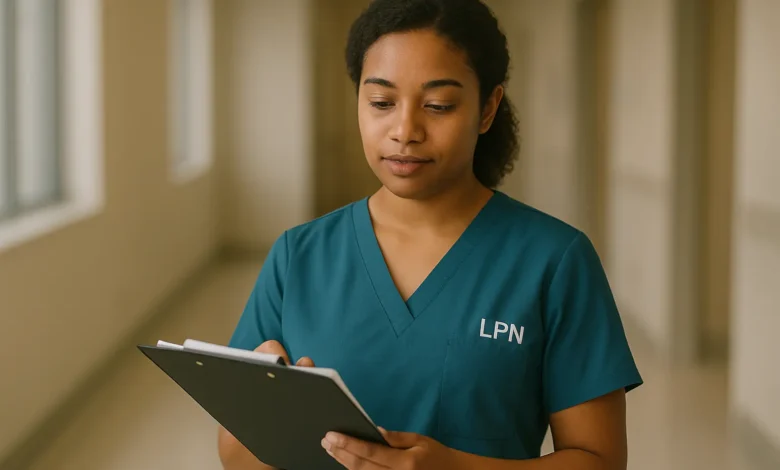Why More LPNs and LVNs Are Taking Legal Protection Into Their Own Hands

Licensed Practical Nurses (LPNs) and Licensed Vocational Nurses (LVNs) are the backbone of patient care in countless healthcare environments. They provide the personal, day-to-day attention that patients rely on, often forming the most consistent and compassionate link between doctors and individuals. But with that hands-on responsibility comes real risk — and in 2025, more LPNs and LVNs are realizing that relying solely on their employer’s protections may no longer be enough.
With malpractice claims rising and professional expectations growing, many nurses are beginning to proactively secure personal liability coverage. The shift reflects a broader trend: nurses are no longer waiting for something to go wrong — they’re protecting their careers before a crisis hits.
The Growing Risk Landscape for Practical and Vocational Nurses
Healthcare is evolving rapidly. As systems grow more complex and staffing shortages stretch resources thin, LPNs and LVNs are taking on expanded roles. From administering medications to documenting patient progress and coordinating with care teams, these professionals are now involved in nearly every aspect of patient treatment.
Unfortunately, this increased responsibility has also led to more exposure to legal claims. Even minor errors in charting or patient communication can spark allegations of negligence. The consequences can be severe — including disciplinary action, job loss, or even lawsuits that target the individual nurse directly.
see also: Customer Assistance Line: 7066074599
Why Employer Coverage May Not Be Enough
Many LPNs and LVNs assume that their facility’s insurance will automatically protect them if a legal issue arises. However, that’s not always the case. Employer-provided policies are designed to shield the institution, and they don’t always extend full legal protection to individual staff members.
In some instances, nurses may be left uncovered if:
- They’re named separately in a lawsuit
- The incident falls outside the scope of their duties
- They work per diem or across multiple employers
- The employer’s legal team decides not to represent them
That’s why more nurses are opting for personal liability coverage — to ensure they’re protected even if their employer’s policy falls short.
Real-World Consequences of Being Uninsured
Consider a scenario where an LVN administers a medication that causes an unexpected reaction in a patient. Despite following protocols, the patient’s family files a malpractice claim. If the employer chooses not to fully defend the nurse, legal costs could become a personal burden.
Without individual liability insurance, even innocent nurses may face:
- Attorney fees
- Court costs
- Lost income from time off work
- Reputational harm that can derail future job opportunities
Having personal coverage means having someone in your corner — not just financially, but professionally.
What Does Liability Insurance Typically Cover?
For LPNs and LVNs, malpractice or professional liability insurance generally covers several key areas:
- Legal defense costs (even if you’re not found at fault)
- Settlements or judgments related to civil lawsuits
- Disciplinary hearing representation
- Lost wages related to time spent dealing with a claim
- Personal coverage across multiple work sites or contracts
This kind of insurance is especially valuable for nurses who freelance, travel, or work in multiple facilities — where employer coverage may vary or not follow them between jobs.
The Rise of Multi-Facility and Gig Nursing
Today, more nurses are choosing to work outside of traditional full-time employment. Some take on weekend shifts at secondary facilities, while others engage in contract nursing through agencies. This flexibility offers increased income and freedom, but it also introduces gaps in employer protection.
For these professionals, insurance for LPNS have become an essential part of their toolkit. Not only does it fill coverage gaps between jobs, but it also ensures consistent legal support — no matter where or how they work. This is especially important in states that require proof of insurance for independent or freelance practitioners.
State Boards Are Becoming Stricter
Many state licensing boards are raising the bar when it comes to liability preparedness. Some now require individual malpractice insurance for certain certifications or independent nursing practices. Others recommend it as part of professional development or continuing education.
Failing to comply with these requirements can impact license renewal or job eligibility. By investing in personal liability insurance, LPNs and LVNs are not only complying with evolving standards — they’re demonstrating accountability and professional foresight.
Insurance Builds Career Confidence
Legal protection doesn’t just guard your wallet — it empowers you in your work. Knowing that you have coverage allows you to focus fully on patient care, without the constant anxiety of what could happen if something goes wrong.
Nurses who carry personal coverage often report feeling:
- More confident in taking initiative
- Less stressed in high-risk environments
- Better prepared for unexpected challenges
This kind of mental clarity is invaluable in fast-paced clinical settings where quick decision-making is critical.
The Financial Reality: Affordable and Flexible
One of the biggest myths about personal malpractice insurance is that it’s too expensive. In reality, most LPNs and LVNs can find coverage for a reasonable annual premium — especially when they tailor the policy to their job type, state, and risk level.
Many providers also offer discounts for:
- New graduates
- Clean disciplinary records
- Low-risk work settings
- Bundled professional coverage
The result? You don’t have to break the bank to protect your career. In fact, many nurses find that personal coverage gives them access to better job opportunities, particularly in high-paying contract or travel positions that require it.
New Grads and Career Starters Are Getting Onboard
It’s not just seasoned nurses embracing this change. Nursing schools, job boards, and licensing agencies are increasingly encouraging new grads to secure coverage before they even begin their first role. By doing so, they’re avoiding the trap of assuming their employer will handle everything.
Starting a career with this layer of protection in place demonstrates professionalism and foresight — qualities that employers value and patients benefit from. It also helps build good habits around personal accountability and risk management.
What to Look for in a Personal Policy
When exploring coverage options, LPNs and LVNs should focus on policies that include:
- Clear coverage limits (both per-claim and annual)
- Legal defense benefits
- Licensing board protection
- Portability between jobs
- Flexible terms for part-time or per diem roles
Reading the fine print and asking questions is crucial. Choose a provider that understands the unique risks of nursing and offers responsive customer support. Your career deserves that level of attention.
Taking Control of Your Professional Future
The message is clear: LPNs and LVNs can no longer afford to rely solely on outside forces to protect their careers. Legal protection has become a professional necessity, not just a safeguard for worst-case scenarios.
By securing personal liability coverage, nurses are doing more than following industry trends — they’re taking full ownership of their future. It’s a smart, empowering move that aligns with the reality of modern nursing.




